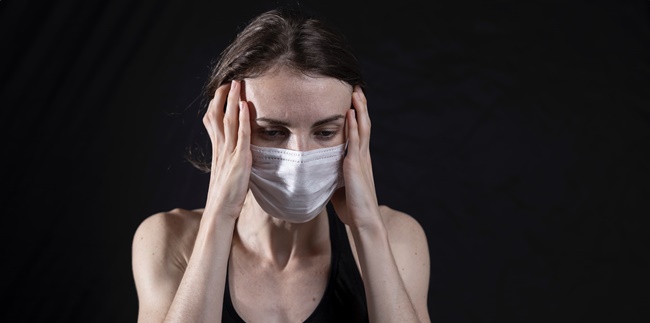5 Ways to Treat Ingrown Nails at Home, Also Know the Causes and Symptoms
Here are some ways to treat ingrown nails at home, along with the causes and symptoms. Let's check it out, KLovers.

Kapanlagi.com - Excessive exposure to free radicals is said to be a trigger for health problems. So what are free radicals and their negative impact on health?
The source of free radicals can come from external and internal factors. This means that the exposure to free radicals can come from within our own bodies or from external factors such as the environment.
The negative impact of excessive and continuous exposure to free radicals on health can be felt. These free radicals can accumulate in the body, causing inflammation. That is why certain health problems can occur due to high exposure to free radicals.
Below are explanations of what free radicals are and their negative impact on health. Here are some references about free radicals and their impact on health, as well as ways to counteract them, compiled by kapanlagi.com from various sources.

(credit: unsplash.com)
The term free radicals is often associated with the causes and triggers of certain health problems. However, not many people may know what free radicals are. Here is an explanation of the definition of free radicals.
Free radicals themselves are known to be molecules or atoms that are formed imperfectly, with one electron. That is why free radicals try to find other molecules to bind to and pair with. As a result, free radicals become unstable and cause cell damage.
Exposure to free radicals does not have a negative impact on the body if the amount or level is low. However, excessive and continuous exposure to free radicals is what can cause damage to body cells or inflammation. As a result, it can trigger the emergence of health problems due to high exposure to free radicals.

(credit: unsplash.com)
Free radicals can be obtained from external and internal factors. External means they can come from outside the body, or known as exogenous. Meanwhile, internal sources come from inside the body, known as endogenous. The sources of free radicals can be found in the following review.
- Sources of free radicals from internal factors (endogenous)
Internal factors mean that sources of free radicals can come from inside the body. Among the sources of free radicals that come from inside the body, as reported by halodoc.com, include autooxidation, enzymatic oxidation, and respiratory burst. These free radicals are formed due to the presence of imperfect or damaged cells that can accumulate in the body. As a result, they can trigger certain health problems.
- Sources of free radicals from external factors (exogenous)
On the other hand, from external factors, sources of free radicals can come from the environment or contaminated food. Among these external sources of free radicals are air pollution, UV radiation, chemical pesticides, cigarette smoke, or alcohol.

(credit: unsplash.com)
As mentioned in the previous review, exposure to free radicals can have negative effects on health if in high levels and continuous. The negative effects of exposure to uncontrolled amounts of free radicals can be seen through the following review.
- Causes oxidative stress in the body that triggers certain health problems.
- Causes cell damage in the body such as skin cells.
- Triggers chronic diseases like cancer due to high exposure to free radicals.
- Causes premature aging to occur faster due to exposure to free radicals.

(credit: unsplash.com)
The negative effects of free radicals can trigger several health problems that need to be aware of. Here are some health disorders or diseases due to exposure to free radicals.
- Cardiovascular disease.
- Diabetes.
- Vision disorders such as cataracts.
- Autoimmune diseases.
- Alzheimer's disease.
- Skin health disorders due to exposure to free radicals.
- Hair health disorders.
- Chronic diseases such as cancer, heart disease, kidney function disorders.
- DNA damage.

(credit: unsplash.com)
To avoid excessive exposure to free radicals, there are several ways to prevent or counter them. Counteracting free radicals aims to prevent damage to body cells.
If the source is from food, counteracting free radicals can be done by consuming healthy foods, especially those with high antioxidants. Antioxidants are known to inhibit exposure to free radicals. This can prevent cell damage caused by exposure to free radicals.
However, there are also several other easy ways to counteract exposure to free radicals. Here are some ways to counteract free radicals to prevent specific health problems caused by high exposure to free radicals.
- Maintain a healthy diet.
- Consume enough fruits and vegetables, especially those rich in antioxidants such as carrots, broccoli, oranges, cherries, tomatoes, and certain types of fish.
- Avoid smoking.
- Reduce alcohol consumption.
- Adopt a healthy lifestyle and exercise regularly.
- Use sunscreen when engaging in outdoor activities to avoid exposure to UV rays.
- Get enough rest.
That is an explanation of what free radicals are and their negative effects on health, along with ways to counteract them. By knowing about free radicals, it can help you recognize the causes of free radicals, triggers, diseases that occur, and how to counteract them at an earlier stage.
Sources: hellosehat.com, id.theasianparent.com, alodokter.com, klikdokter.com
(kpl/nlw)
Cobain For You Page (FYP) Yang kamu suka ada di sini,
lihat isinya
Here are some ways to treat ingrown nails at home, along with the causes and symptoms. Let's check it out, KLovers.
These are the words of Habibie and Ainun about love, can be an expression of the heart for loved ones. Let's check it out KLovers.
Dialogues or narratives in films often become favorite quotes to express feelings. Magic Hour quotes, for example, are quite popular film quotes. Viewers discuss them continuously when this film is aired.
Here are 120 words for hypocrites that stab, becoming subtle and elegant satire. Let's check it out KLovers.
According to the definition of verbs used to indicate a certain action or experience, mental verbs are not much different. This is the definition of mental verbs.
The role of parents is important in the growth and development of children. There is no prohibition on sending children to schools that are considered to have various ways or methods to make children intelligent, but parents should not forget that a child's first education starts at home.
Here is a list of beautiful and lovely Islamic baby girl names, along with their meanings. Let's check it out.
Perhaps at first, you will feel doubtful and afraid if your feelings are not reciprocated. Therefore, before conveying these romantic love words in English, you need to strengthen your heart and prepare yourself to accept whatever reality may occur.
Generally, the symptoms of cytokine storms in covid-19 patients can disrupt the respiratory system and even cause high fever. So what is a cytokine storm? Check out the following review, KLovers!
In a relationship, there are situations that cause one partner to feel jealous. For example, when the partner is too close to someone else or too busy with work. When feeling jealous, you have the right to express it in English.
According to Islamic views, dreams may hold hidden meanings, as narrated in the stories of the prophets. So, what is the meaning of dreaming of meeting someone according to Islam?
There are many ways to make the morning more enthusiastic. One of them is by reading and interpreting morning motivational words.